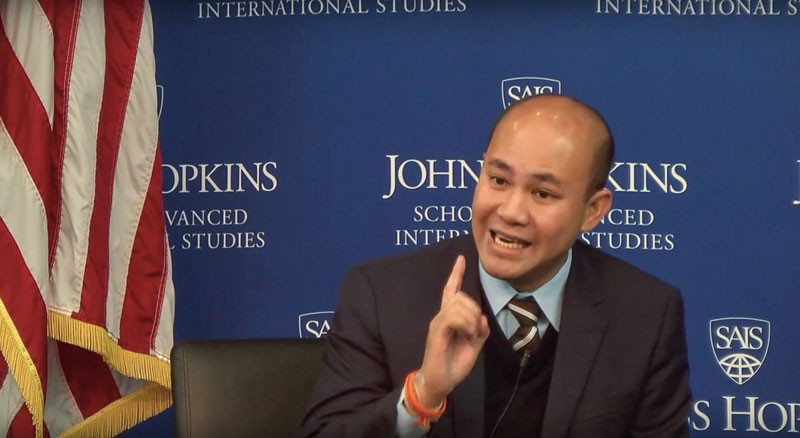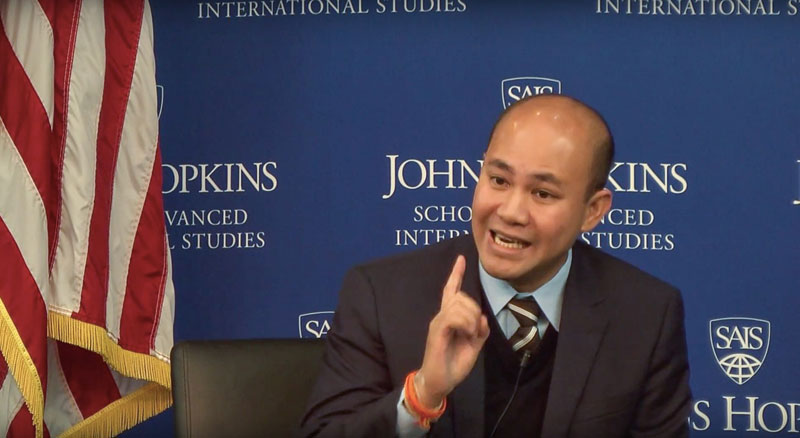Prime Minister Hun Sen’s youngest son, Hun Many, used a speech at the Johns Hopkins University in the U.S. this week to draw parallels between the birth of the U.S. as a nation and his father’s Vietnamese-backed annihilation of Pol Pot’s Khmer Rouge.
Speaking on U.S.-Cambodian relations at the university’s School of Advanced International Studies in Washington on Wednesday, Mr. Many said that the U.S.—despite its present-day domestic peace— was ultimately shaped by two early conflicts on its soil.

“One is the U.S. Independence War. How is it that against all odds, against the domination of the management of the British at that time [that the colonies won]?” asked Mr. Many, who is also a CPP lawmaker.
“I think the 13 colonies came all together with the same mindset. I think the idea of self-determination of the people of one nation was born and with the drive of patriotism and believing in achieving the impossible.”
Mr. Many said the preservation of national unity during its Civil War was the U.S.’ other great defining event, and pushed his audience to “imagine that the outcome of the U.S. Civil War was different.”
“Former President Abraham Lincoln made [the U.S.] what it is. And the decision that they had to make at all costs? To keep the U.S. states all together,” Mr. Many said. “That’s what made the U.S. what it is.”
Switching then to Cambodia, Mr. Many said Cambodians had much to be ashamed about in their history—but that aspects of the U.S. fight for self-determination and unity could be found in its struggle.
“It is also a history where pride, where patriotism, where sacrifice and heroism and believing that history can be better [exists]. That’s why a small group of Cambodian youth then, against all odds, stood up,” he said, referring to those who toppled the Khmer Rouge.
“Of course, they had to seek refuge on the Vietnamese side of the border to build up an army strong enough—with the support logistically of the Vietnamese troops— and [we are] thankful for that, to be able to, against all odds…liberate our country,” he said.
“January 7, 1979 is what marks the ability of Cambodian people to stand up on two feet and saying ‘OK, we have to do this on our own. We have to dictate the future of our country,’” Mr. Many said.
Vietnam’s military role in the ousting of Pol Pot, he said, was only as an assistant, and allowed his father’s government to eventually rise up and oust the last holdouts of the Khmer Rouge in the 1990s.
“It is an evolution, just the same way as what makes the U.S. such a great nation today—[it] starts with one decision-making: self-determination, and believing in a better future of that one nation, as a nation. And that’s what we did also,” Mr. Many explained.
“January 7, 1979 was the starting point,” he said. “Another defining factor for us was 1998 and the ‘win-win’ strategy, which completely dismantled the political structure [and] leadership of the Khmer Rouge, unifying the entire Cambodia under one constitution.”
The question of whether January 7 represents a day of national liberation or the start of a decade-long colonization by the Vietnamese—or both—has long divided Cambodia’s ruling and opposition parties.
Kem Monovithya, the opposition’s deputy director of public affairs and daughter of deputy opposition leader Kem Sokha, said that Mr. Many’s analogy between the history of the U.S. and Cambodia was disingenuous.
“It’s an absurd comparison,” said Ms. Monovithya, who, like Mr. Many, has studied in the U.S.
“Note the word ‘independence’ in the American War of Independence where Americans fought for sovereignty from foreign powers, contrary to January 7 overthrow, which was a foreign occupation in Cambodia where we lost sovereignty,” she said in an email.
“It’s sad to see a young CPP still glorifying January 7 as pretext to their never-ending entitlement to rule Cambodia from generation to generation. But for the CNRP, we look forward—I have far more interest in the future of Cambodia than in 1979.”
During questions that followed Mr. Many’s speech, a man identifying himself as Michael Duong, a Cambodian refugee who said he grew up in the U.S. and had, like Mr. Many, graduated from the National Defense University in Washington, pressed Mr. Many on his liberal credentials.
“My question is how can you lead Cambodia into the future with rule of law when the CPP and your father is known to be a strongman where he has ruled Cambodia for almost 40 years, where your cronies are ruling Cambodia under terror and deny some basic freedom and democracy?” Mr. Duong asked.
Mr. Many said he doubted Mr. Duong’s knowledge of the present-day situation in Cambodia.
“Michael Duong is apparently a Cambodian-American. Have you been back?” Mr. Many shot back. Mr. Duong responded that he had returned, prompting Mr. Many to tell him he did not believe that his analysis was correct.
“Your comment is very well taken but frankly speaking, I don’t see [that] Cambodian society at the moment is all that bad,” Mr. Many added.
“Yes, we have problems. Yes, we have issues. But how can you move forward for a better Cambodia with such a mentality?”




